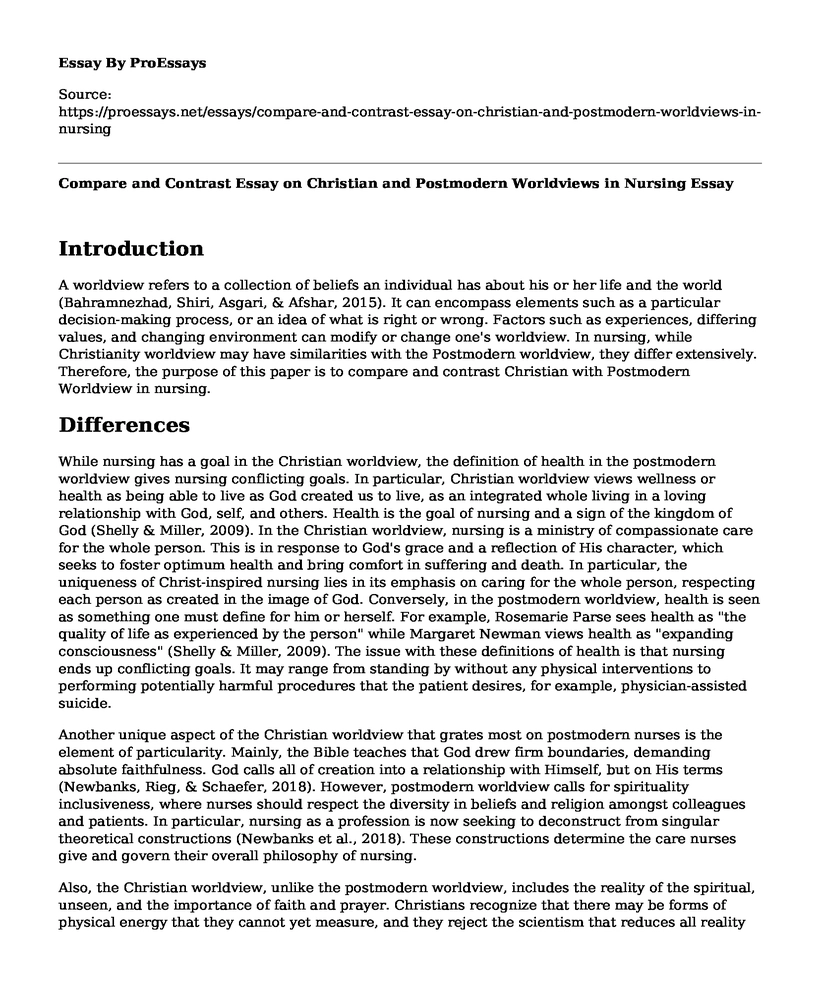Introduction
A worldview refers to a collection of beliefs an individual has about his or her life and the world (Bahramnezhad, Shiri, Asgari, & Afshar, 2015). It can encompass elements such as a particular decision-making process, or an idea of what is right or wrong. Factors such as experiences, differing values, and changing environment can modify or change one's worldview. In nursing, while Christianity worldview may have similarities with the Postmodern worldview, they differ extensively. Therefore, the purpose of this paper is to compare and contrast Christian with Postmodern Worldview in nursing.
Differences
While nursing has a goal in the Christian worldview, the definition of health in the postmodern worldview gives nursing conflicting goals. In particular, Christian worldview views wellness or health as being able to live as God created us to live, as an integrated whole living in a loving relationship with God, self, and others. Health is the goal of nursing and a sign of the kingdom of God (Shelly & Miller, 2009). In the Christian worldview, nursing is a ministry of compassionate care for the whole person. This is in response to God's grace and a reflection of His character, which seeks to foster optimum health and bring comfort in suffering and death. In particular, the uniqueness of Christ-inspired nursing lies in its emphasis on caring for the whole person, respecting each person as created in the image of God. Conversely, in the postmodern worldview, health is seen as something one must define for him or herself. For example, Rosemarie Parse sees health as "the quality of life as experienced by the person" while Margaret Newman views health as "expanding consciousness" (Shelly & Miller, 2009). The issue with these definitions of health is that nursing ends up conflicting goals. It may range from standing by without any physical interventions to performing potentially harmful procedures that the patient desires, for example, physician-assisted suicide.
Another unique aspect of the Christian worldview that grates most on postmodern nurses is the element of particularity. Mainly, the Bible teaches that God drew firm boundaries, demanding absolute faithfulness. God calls all of creation into a relationship with Himself, but on His terms (Newbanks, Rieg, & Schaefer, 2018). However, postmodern worldview calls for spirituality inclusiveness, where nurses should respect the diversity in beliefs and religion amongst colleagues and patients. In particular, nursing as a profession is now seeking to deconstruct from singular theoretical constructions (Newbanks et al., 2018). These constructions determine the care nurses give and govern their overall philosophy of nursing.
Also, the Christian worldview, unlike the postmodern worldview, includes the reality of the spiritual, unseen, and the importance of faith and prayer. Christians recognize that there may be forms of physical energy that they cannot yet measure, and they reject the scientism that reduces all reality to the material or physical phenomena.
Similarities
Nevertheless, despite their differences, both Christian and Postmodern worldview share some similarities. Christians, just like postmodernists affirm many of the concerns and goals of the New Paradigm, although their understanding of the concepts involved may differ. In particular, Christians and Postmodernists share the concern for a more personal approach to health care, encompassing the use of touch. They hold a holistic view of the person and recognize the need to avail comfort in human suffering (Nikfarid, Hekmat, Vedad, & Rajabi, 2018). Newbanks et al. (2018) add that Christian and postmodern nurses embrace and widely accept values such as compassionate caring and unconditional love.
Conclusion
To conclude, while Christians and Postmodernists may share the concern for a more personal approach to health care and the holistic view of the person, the Christian and Postmodern worldviews in nursing differ largely. While Christian nurses believe in God, Postmodern nurses believe in self.
References
Bahramnezhad, F., Shiri, M., Asgari, P., & Afshar, P. F. (2015). A Review of the Nursing Paradigm. Open Journal of Nursing, 5(01), 17.
Newbanks, R. S., Rieg, L. S., & Schaefer, B. (2018). What Is Caring in Nursing?: Sorting Out Humanistic and Christian Perspectives. Journal of Christian Nursing, 35(3), 160-167.
Nikfarid, L., Hekmat, N., Vedad, A., & Rajabi, A. (2018). The main nursing metaparadigm concepts in human caring theory and Persian mysticism: a comparative study. Journal of Medical Ethics and History of Medicine, 11.
Shelly, J. A., & Miller, A. B. (2009). Called to care: A Christian worldview for nursing. InterVarsity Press.
Cite this page
Compare and Contrast Essay on Christian and Postmodern Worldviews in Nursing. (2022, Jul 29). Retrieved from https://proessays.net/essays/compare-and-contrast-essay-on-christian-and-postmodern-worldviews-in-nursing
If you are the original author of this essay and no longer wish to have it published on the ProEssays website, please click below to request its removal:
- Nursing Philosophy Paper Example
- Insider Threats in Cyber Security Essay Example
- Hospital Challenges Threaten Healthcare Goals: HAIs, Litigations, Misdiagnosis - Research Paper
- Essay on Clinical Trial Study of Cancer: Assessing Treatment Convenience & Types
- Community Healthcare: Stakeholders' Performance, Safety & Competence - Essay Sample
- The Bible's Influence on India: A Study in Mangalwadi's Book - Essay Sample
- Drug Addiction: A Growing Problem in Society - Report Sample







